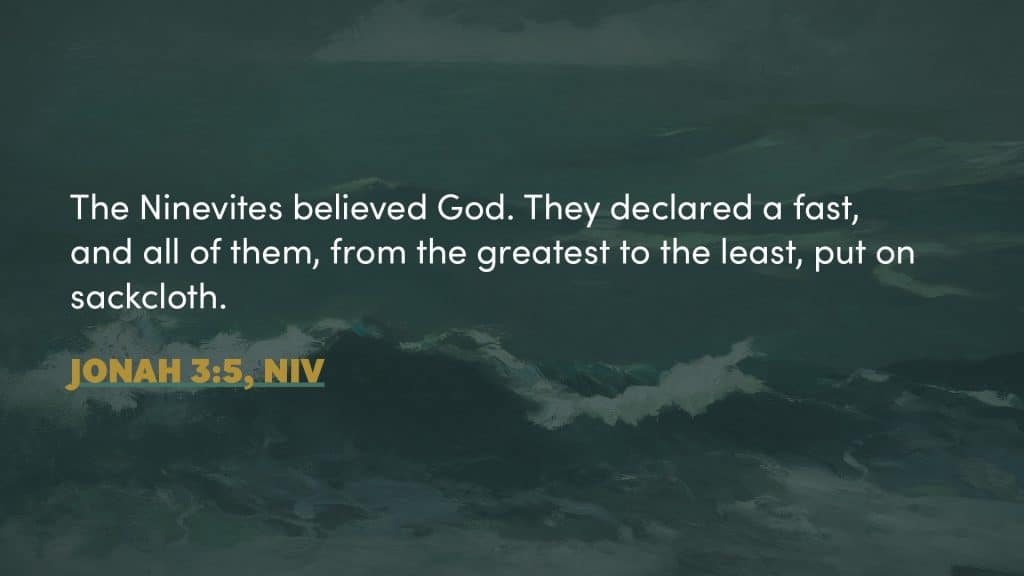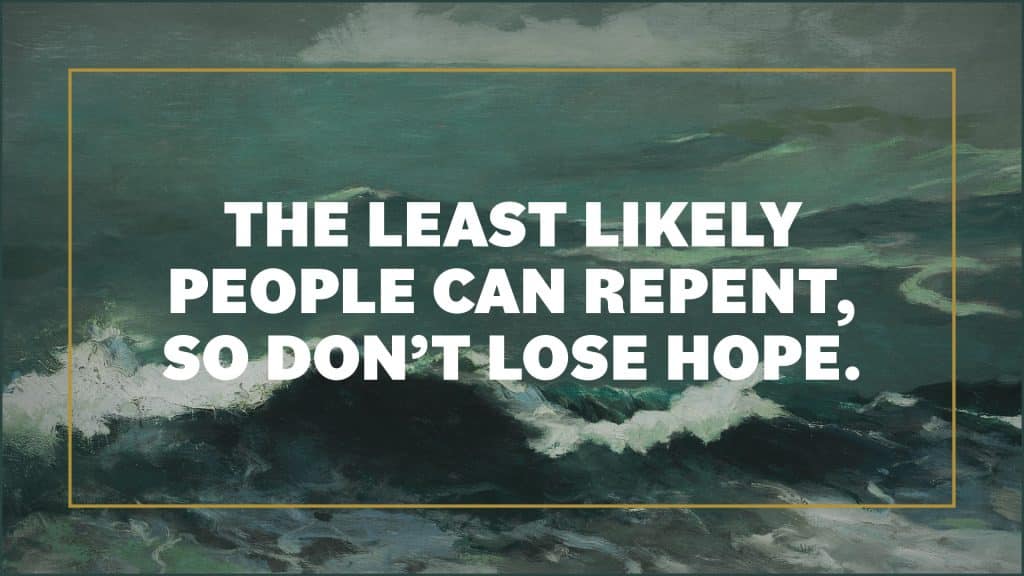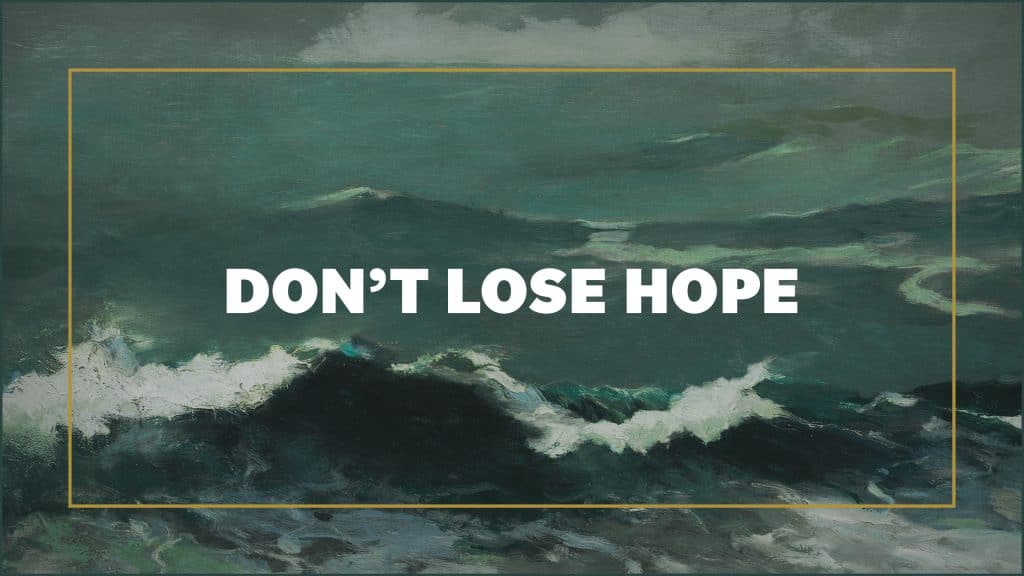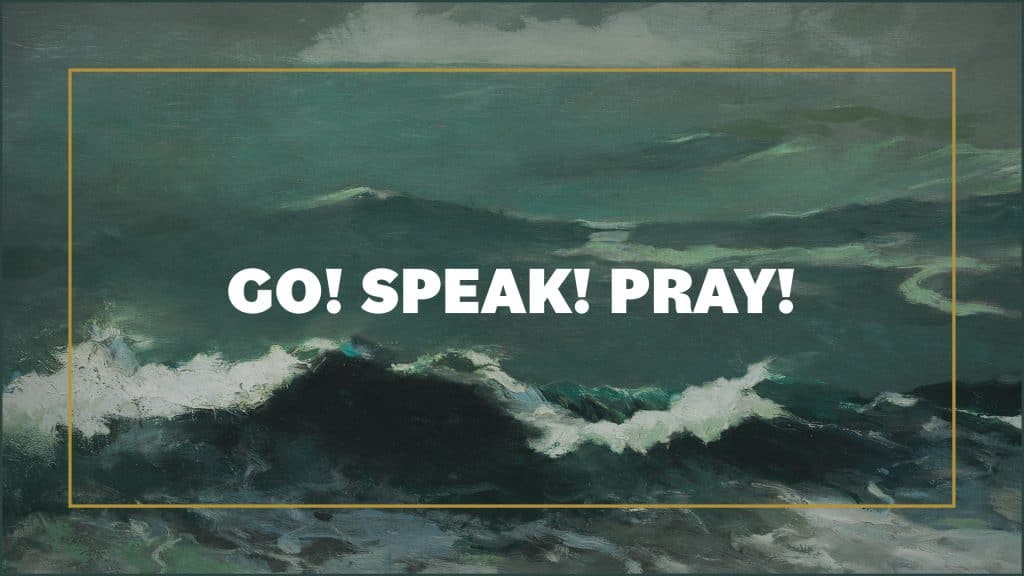This adapted sermon on Jonah 3 reminds us that the least likely people can repent, so Christians should never lose hope for others!
In order to really grasp what happens in Jonah 3, we need to understand some background. The Ninevites were known as ruthless people, but it’s hard to relate to ancient history. So let’s first look at the stories of three modern-day people who were once ruthless in their own ways. Then we’ll be able to relate to the ancient Ninevites to feel the impact of their repentance.
For context, you can read the sermon adaptations of the preceding chapters, Jonah 1 and Jonah 2.
Ruthless Ones
Story 1: Rosaria
Rosaria grew up just like about anybody else in the 70s and 80s — thinking for herself. By her late 20s, she adopted the feminist ideology and philosophy, including the LGBTQ advocacy mindset, and she eventually identified as a lesbian.

After earning a Ph.D. from Ohio State University, Rosaria taught in the English Department at Syracuse University from 1992 to 2002. Her specialty was critical theory with a focus on queer theory. She advised the LGBTQ student group, wrote the university’s policy for same-sex couples, and lobbied for LGBTQ aims alongside her lesbian partner.
She was militant in her ideology to the point that she researched the “religious right” (her words) and wrote against the Promise Keepers in the 90s.
Toward those she opposed, she was ruthless in her own way.
Story 2: Ahmet

Ahmet, a Muslim from Amman, Jordan, grew up going to the mosque on Fridays and saying his daily prayers. His father was an Islamic sheikh (a Muslim preacher). Ahmet was so devout, he genuinely struggled to find someone who loved God more than he did (his words).
His desire to love Allah to the fullest led him to lay down his life as a suicide bomber. For that purpose, he boarded a flight headed to Russia by way of Turkey.
He was ruthless in his mentality because of what he believed about the character of God, whom he called Allah.
Story 3: David Berkowitz
David Berkowitz terrorized New York City between July 29, 1976, and July 31, 1977. He claimed that his neighbor Sam’s dog was one of the demons inciting him to commit his heinous crimes, earning him the moniker “Son of Sam.”

This man murdered six people and wounded seven others, and he taunted the media with his letters. He was eventually arrested and sentenced to 25 years in prison for each of the six murders.
He was ruthless in his own right.
Three totally different people, ruthless in their own ways.
But this was not the end of their stories.
The Ninevites
At the time when God called Jonah to go to them, the Ninevites were a ruthless people.
Assyria, where Nineveh was located, was one of the cruelest and most violent empires of ancient times. Assyrian kings often recorded the results of their military victories, gloating of whole plains littered with corpses and of cities burned completely to the ground.
Tim Keller, in his book Rediscovering Jonah, says this about the Ninevites:
The emperor Shalmaneser III is well known for depicting torture, dismembering, and decapitations of enemies in grisly detail on large stone relief panels. Assyrian history is [quoting Erika Bleibtreu’s article in Biblical Archeology Review] “as gory and blood curdling a history as we know.” After capturing enemies, the Assyrians would typically cut off both legs and one arm, leaving one arm and one hand so they could shake the victim’s hands as they died. They forced friends and family members to parade with the decapitated heads of their loved ones elevated on poles. They pulled out prisoners’ tongues and stretched their bodies with ropes so they could be flayed alive and their skins displayed on city walls. (p. 11)
The Assyrians of that time have been called a terrorist state. That is, the people group to whom God called Jonah to go and preach repentance. No wonder he said, No, not them! Really? Of all people, God, do you think they can repent?
Let’s journey with Jonah as he discovers what God does among the Ninevites to take them from ruthless to repentant.
Jonah 3
Then the word of the LORD came to Jonah a second time: “Go to the great city of Nineveh and proclaim to it the message I give you.”
Jonah obeyed the word of the LORD and went to Nineveh. Now Nineveh was a very important city-a visit required three days. On the first day, Jonah started into the city. He proclaimed: “Forty more days and Nineveh will be overturned.” The Ninevites believed God. They declared a fast, and all of them, from the greatest to the least, put on sackcloth.
When the news reached the king of Nineveh, he rose from his throne, took off his royal robes, covered himself with sackcloth and sat down in the dust. Then he issued a proclamation in Nineveh:
“By the decree of the king and his nobles:
Do not let any man or beast, herd or flock, taste anything; do not let them eat or drink.
But let man and beast be covered with sackcloth. Let everyone call urgently on God. Let them give up their evil ways and their violence. Who knows? God may yet relent and with compassion turn from his fierce anger so that we will not perish.”
When God saw what they did and how they turned from their evil ways, he had compassion and did not bring upon them the destruction he had threatened. (NIV, 1984)
Obedience
At the beginning of chapter 3, Jonah was likely in Joppa, where the fish spit him out on dry ground.
Jonah 3:1-2: “Then the word of the LORD came to Jonah a second time: ‘Go to the great city of Nineveh and proclaim to it the message I give you.’”
God called Jonah all the way from Joppa to Nineveh, which is near modern-day Mosul, Iraq. Moreover, the Ninevites represented the worst enemy of the people of God at the time.
This would be like if God called us to “Go to a huge pride parade and to preach the message I give you.”
You want me to go there? No, no, no, I must not be hearing right.
Or if God called us to “Go and preach to the Islamic Kurdish people in Nashville, Tennessee” (home of the largest Kurdish population in the U.S.)
Aren’t they associated with terrorism? They’re Muslims, right?
Or even, “Go to your perpetrator at the maximum-security prison and proclaim the message that I give you.”
The prison where my perpetrator is incarcerated? You want me to go there? No, no, no, no, no!
Jonah 3:3a: “Jonah obeyed the word of the LORD and went to Nineveh.”
This time, Jonah obeyed. Isn’t it remarkable that God can give us a second chance? Jonah was so passive here that he didn’t even talk back. In Jonah 1 he just bolted, and the thing with the fish happened. Then he repented — at least bodily — and was spit up on dry land.
God had such a fierce desire for the nations that he was willing to take Jonah basically to hell and back to stay on mission.
And Jonah conceded.
I’m glad that God is the God of second chances. And I think God was showing Jonah what he wanted to show the Ninevites, as well.
A Call to Repentance
Jonah 3:3b-4: “Now Nineveh was a very important city—a visit required three days. On the first day, Jonah started into the city. He proclaimed: ‘Forty more days and Nineveh will be overturned.’”
This reminds me of Monty Python’s “Bring out your dead!” I mean, he’s basically just declaring, So, everyone, this thing is going to happen. I mean, shortest sermon ever. It doesn’t sound very hopeful either.
The word for “overturned” here can also be translated “changed” — it’s probably an intentional pun. “Forty more days and either you’ll be overturned” or, to paraphrase, you will change at a heart level. The same Hebrew word is used of Pharaoh in Exodus 14:5, when he changed his mind. He agreed to let his slaves go, even though he was ruthlessly opposed to it.
Forty more days and the city will be changed, one way or another. It’s up to you.
Responding with True Repentance

Jonah 3:5a: “The Ninevites believed God.”
What? All of a sudden they believe in God? All I said was, ‘Forty days and Nineveh will be overturned.’
Jonah must have been utterly dismayed in this moment.
In our culture, some of us think in terms of sales. As a business owner, I have to think about how I do sales. When we think about the gospel, we think we have to pitch it, make sure we go through the nuances and the details.
Jonah’s message actually sounds like he was trying to make it not work. He was trying to ruin this sale, but all of a sudden, the sovereignty of God kicked in because
God has a burning desire for the nations.
In his repetitious amnesia, Jonah probably even forgot the fact that his very forefather, Abraham, was called from that very region — from Ur of the Chaldees (modern-day southern Iraq). He could have identified with him, because God also told Abraham, “Go … to the land I will show you” (Genesis 12:1), just like he told Jonah, “Go … and proclaim … the message I give you” (Jonah 3:2).
Now, it’s very likely that Jonah did preach more than the one sentence recorded in Scripture, but that text suggests that his message was concise and minimalistic. Even so, Nineveh believed in God. Surely their faith wasn’t sufficient? Wasn’t it just hell insurance? Were they afraid? We don’t know exactly the texture of their faith. But what we do know is that this is the beginning of real faith, and not just for “some people.”
Jonah 3:5b: “They declared a fast, and all of them, from the greatest to the least, put on sackcloth.”
If there was any doubt about what was going on at a heart level, their bodies showed all the signs of true repentance in the ancient Middle East.
Jonah 3:6: “When the news reached the king of Nineveh, he rose from his throne, took off his royal robes, covered himself with sackcloth and sat down in the dust.”
Nineveh repented, from the bottom to the top.
Did that really happen?
Why would the most ruthless people at the time just totally repent, citywide, at the drop of a hat?
Perhaps there were other factors besides Jonah’s words that influenced the Ninevites’ behavior.
The Assyrians kept a catalog of significant events in their history, called an eponym. This was a list of the big cataclysmic events that occurred in each year. One event on that list is either a sporadic or continuous famine from 765 to 759 B.C. Six years of famine are recorded, starting with a plague in 765, along with a solar eclipse that occurred on June 15, 763 B.C.
Historians are confident of these details. This was right around the time that we know Jonah was doing his ministry.

The U.S. experienced a solar eclipse in 2017. Since it was going to be visible in middle Tennessee, I took a couple hours off work to watch it. I mean, it was this once-in-a-lifetime thing! I had a new camera at the time, so I set up a tripod and took this video of my wife and me observing the eclipse with those special glasses:
Everyone in Nashville was talking about “totality,” when we experienced the total eclipse—quite the phenomenon! It was like the day turned into night all of a sudden, just for a few moments. It was incredible.
Eclipses had a significant meaning to the ancient Assyrians. They became very superstitious about them because some kings actually died shortly after one. They would even put up mock kings — literally take a peasant from the streets and put a crown and robe on him — in an attempt to trick the gods into smiting that person instead of the actual king.
So it is likely that:
The king of Nineveh coming off of his throne to put on sackcloth was actually a sign of his fear of death.
My conclusion?
I believe that Jonah came onto the scene during the summer of 763, shortly after the June 15 eclipse, to preach his message. If so, the people could have been ready to do whatever they were asked: “Things are getting really weird … we just don’t want to die!”
God’s timing in our lives is very interesting, isn’t it? We don’t want to miss opportunities at the cancer diagnosis, at the car crash, at the death.
When someone’s life is dramatically altered on the exterior, something happens, and all of a sudden, their heart is tender.
As leaders, let’s not miss those moments. Let’s be ready to care for others.
Let’s be ready to speak and be extra attuned to what the Spirit would have us do.
Jonah 3:7: “Then he issued a proclamation in Nineveh: ‘By the decree of the king and his nobles: Do not let any man or beast, herd or flock, taste anything; do not let them eat or drink.’”
Fasting has been practiced throughout history as a way for people to communicate their desperation to God. It is a biblical practice, but other faiths recognize its significance too. They can’t help it; God designed us that way.
Even now when we repent, we can fast as a way to express that utter desperation.
Let’s train our children to fast in repentance. When we become aware of our own sin, let us repent. Maybe not in sackcloth and ashes (I don’t know so much about that), but let us refrain from eating for the purpose of grappling with the severity of our own sin.
And let us fast on behalf of our city, for the people who desperately need God.
Jonah 3:8a: “But let man and beast be covered with sackcloth. Let everyone call urgently on God. Let them give up their evil ways and their violence.”
So it’s not enough for them to abstain from eating, they’re going to cover their animals in sackcloth too? That’s kind of funny … and weird …
Jonah 3:8b: “Let everyone call urgently on God. Let them give up their evil ways and their violence .”
As it says in Hebrews 4:7: “Today, if you hear his voice, do not harden your hearts.”

That day was the Ninevites’ “today.” Jonah was saying, Call urgently on God.
I just heard of a healthy man who was about my age, late 30s, who died in the middle of the night because something with his heart. Tomorrow is not guaranteed for any of us. If you are convicted of your sin, urgently call on the Lord.
God Relents
Jonah 3:9: “Who knows? God may yet relent and with compassion turn from his fierce anger so that we will not perish.”
Part of this is a prophetic call to Israel to show how easily the Ninevites were willing to repent. And yet Israel was not repentant at the time, as we learned from 2 Kings 14. The king of the most ruthless people of the day said, “Who knows? God may relent and we will not perish.”
This is a prophetic call to the people of God. It demonstrates that:
The pagans knew God better than Israel did.
Jonah 3:10: “When God saw what they did and how they turned from their evil ways, he had compassion and did not bring upon them the destruction he had threatened.
God felt something for the Ninevites.
It’s funny to think about the emotions of God, but we know very well that Jesus Christ felt for the people of God. The Bible says that he wept over Jerusalem and he wept in front of the tomb of Lazarus. He feels for the dead and the dying. He has compassion for the lost.
I’m not talking about mere mental assent or an intellectual exercise of compassion, where God is thinking, Well, I need to be consistent and love all people. God feels deeply for the nations. He has “gut-level” longing for the salvation of all of his children.
He is the father standing on the porch as the prodigal son comes home. It says in Luke 15:20 that he “was filled with compassion for him; he ran to his son, threw his arms around him and kissed him.”
That is an emotional response from an emotional God who longs with a fierce burning for the nations, for the lost, for the worst among us, for the ruthless —for each one of us. And I think one of the first lessons in the school of the compassion of God (the same school Jonah was attending) is realizing that we too have been utterly depraved.
Have you forgotten how far he’s brought you?
God has brought you from the brink of death. He’s brought me from utter destruction. We were that close to destruction, and he saved us.
We were the rebels. We were the ruthless. We were the children who ran away from home, leaving God waiting for us to return.
But at the same time, we were also the self-righteous.
I think that when Jesus told the parable of the prodigal son, he had in mind the story of Jonah. In Jonah’s story we find the rebel: the sailors, Nineveh, and Jonah. We find the self-righteous: Jonah and Israel. And all along, we find the father displaying his heart of compassion.
Jonah must have wondered how God could be like that: Do you not see their evil deeds? They were ruthless! Do you remember how many people they have slain?
- How can God be so compassionate and yet fierce?
- Where is his sovereignty when he’s both kind and severe?
- How can he be just and merciful at the same time?
God is complex and consistent. He’s more complicated than we can understand; yet we love Him for everything He is. He doesn’t change.
When the Ninevites responded to his warning with repentance, God relented. Jonah, hanging on to God’s consistency, must have pushed back, Weren’t you going to destroy them, God? What about punishment for sin ‘to the third and fourth generation’?
While God doesn’t change in his character, he can change his mind.
When he makes a covenant promise, that’s forever. But when he speaks a word of caution or threat and but then chooses to do something different, it’s because he’s also relational. He wants to hear from us, to see what we’ll do.
Why doesn’t he just automatically save everybody? Because he wants our heart, and he’ll do anything for it.
Here’s the main point of my message today:

The least likely person can repent, and God can relent. So don’t lose hope.
Our repenting and God’s relenting are equally miraculous; both come from God.
Only God Can Convert Hearts
Part of our problem is that we try to convert people to Christ in our own strength, as if it’s our work. We want to tell someone, “The Bible says that God loves you, so just love Jesus too.” We can say that with the attitude, I know God told me to preach the gospel, so I’m preaching. And then we get preachy, you know? We try to make it happen, and we get responses like, “Dude, lay off! I didn’t ask for this.”
The truth is, only the sovereign God can convert hearts. It’s his work — we merely get to partner with him, sometimes not even very well.
In Jonah’s case, we see this to the ultimate. Even though Jonah delivered the message begrudgingly, it still worked. God still worked. I don’t know how he did it, but God worked on people’s hearts then, and he works on our hearts now. He brings the least likely people to repent because he longs to relent.
There was a man who started attending my church some years ago, and his marriage was falling apart. In the same year, he lost his business and also thought he was going to lose his kids. It was cataclysmic for him. So he went back to drinking.

We all cope with life in different ways, don’t we? For him, it was a downward spiral that got progressively worse over the course of four years. His friends noticed it. His discipleship group here at the church also noticed it and had compassion on him. After he finished a step study session with Celebrate Recovery, they met together on a Saturday morning and told him, “Friend, we can’t make you do anything. But if you’re willing, we’ll take you to rehab right now.”
He repented, and God relented.
Eight months later, he came out sober and filled with hope because he got to know God in a new way. He learned that:
If we repent so that he can relent, the God of hope takes people, businesses, relationships, marriages that weren’t doing well and breathes hope into them.
Don’t lose hope, friends!
On the other hand, I know a man who succumbed to the lure of internet pornography. His virtual behavior eventually turned into reality: when he was away on international business trips, he would visit brothels and hire women to fulfill his fantasies.

Like all secret sins, it didn’t say secret for as long as he wanted it to. At one time during his decades-long addiction to pornography, his son walked in on him. They never talked about it. I don’t know the state of that man today, but I do know the damage his sin caused in his life.
We have a choice. We can either repent and God relent, or we can keep doing what we’re doing.
Nineveh changed in 40 days.
The clock is ticking for us, too, even if we don’t hear it. What can God do? Can God convert our hearts? Don’t lose hope.
Ruthless No More
Rosaria
Remember Rosaria, the English professor who was ruthless in her militancy against the religious right?
Her article against the Promise Keepers sparked a discussion with a pastor in town named Ken Smith, who became a resource for her — even as she continued to write against his belief system. He invited her into his home, shared a meal with her. And over the course of two years, from 1997 to 1999, God converted Rosaria Butterfield’s heart.

Today, she is as far from the lifestyle and ideology that she once subscribed to as you can get. She is married to a Reformed pastor. They sing only Psalms and no other kinds of songs, and she’s a homeschool mom.
The pride flags found their way out the front door after Jesus came in.
God can take the least likely people and convert their hearts beyond recognition. Rosaria said that, at one point, she lost everything but the dog, but what she gained was life eternal. She never looked back.
Ahmet
Ahmet was at the airport in Turkey on his way to fulfill his calling to commit suicide on behalf of the god that he thought he knew. When his liaison didn’t show up, it threw him into a tailspin. He had believed in a sovereign god, too, and this caused him to doubt Islam for the first time.
By the time that I met him, he had been baptized six months earlier in the same Mediterranean Sea that Jonah had plunged into. His doubt in Allah had caused Ahmet to read the New Testament, where he saw who Jesus was and learned that God is a God of compassion.
Thus God converted the least likely to his heart.
Ahmet went from truly ruthless to repentant, and God relented.
David Berkowitz
In the 1970s, David Berkowitz received six back-to-back life sentences in prison. No way of getting out. But do you know what happened between 1977 and 1987?
God converted a serial killer’s heart to Christ and he repented so that God could relent — he was born again. God converted to Christ the least likely person I can imagine.
When people asked him, “Do you want to get out of prison?” he replied, “I have a ministry in prison right now.” He’s written essays and shared his testimony about his transformation. He’s also cautioned people against the dangers of the occult.
David changed his nickname from “Son of Sam” to “Son of Hope,” signifying his transformation out of darkness into light. Normally, when someone changes their name, I think it’s a little narcissistic. But in this case, he gave glory to God.
It’s utterly unbelievable that God could take a serial killer and make him a serious disciple, but he can, and he did.
God can cause the absolute least likely people to repent.
Don’t Lose Hope
In Jonah 3:10, when we read about God’s compassion for the nations, his gut-level feeling for the lost, I think he’s inviting Jonah into his heart: Don’t you see it? You see ruthless; you see depraved; you see despicable. But I see hope.
A lot of times people put up a front, a façade. They think that their lifestyle is what they want. But God sees through it. He loves them; they are in his own image.
How we long for our children to be saved. We long for our parents, our friend, our relative. “God, would you save them?”
To those of you who have lost hope: Don’t. If God can save any of those people that I talked about today, if he can save all of the Ninevites, then there’s hope for you and me.

Now, sometimes we haven’t lost hope, but we stop sharing the gospel because they don’t want it. There may be a time for that.
But maybe you have really lost hope. If so, invite you today to give that to the Lord.
When I was a young man, I started praying for people by name. I wrote their names down, and I prayed for them regularly: “God, save them!”
If I’m honest with you, I must confess that I’ve lost hope for certain individuals. I can name them. I could look back at my list: No, it’s too late for them. No, I’ll stop praying for them. I don’t say those things out loud, but that’s what goes on in my heart.
Who have you lost hope for?
Who is God calling you to regain hope for? Add them back to your prayer list.
Or have you perhaps lost hope for yourself? That habit you can’t kick? Express to God your desire to have his desires.
The Sovereign God of the universe can reach through the atmosphere into your heart and grip it with his compassion. He can change your heart — not just for a moment, but permanently. He can give you a new discipline; a new spirit.
You might have been baptized, you might have been playing the game for a while; he can still receive your repentance and relent.
God has not lost hope for us, and he invites us to not lose hope for the least likely.

There’s a time to go. There’s a time to preach, to speak the word of God on behalf of God. We must go, and we must speak when God calls us to speak.
But there’s also a moment to pray and to keep praying. To keep waiting. And when the moment comes and God says “Now!” — that is the hope of Christ for the world.
Subscribe to HIM Publications here to get long-form discipleship content delivered to your inbox each week.
The Ahmet image in this post was created with the aid of AI.
